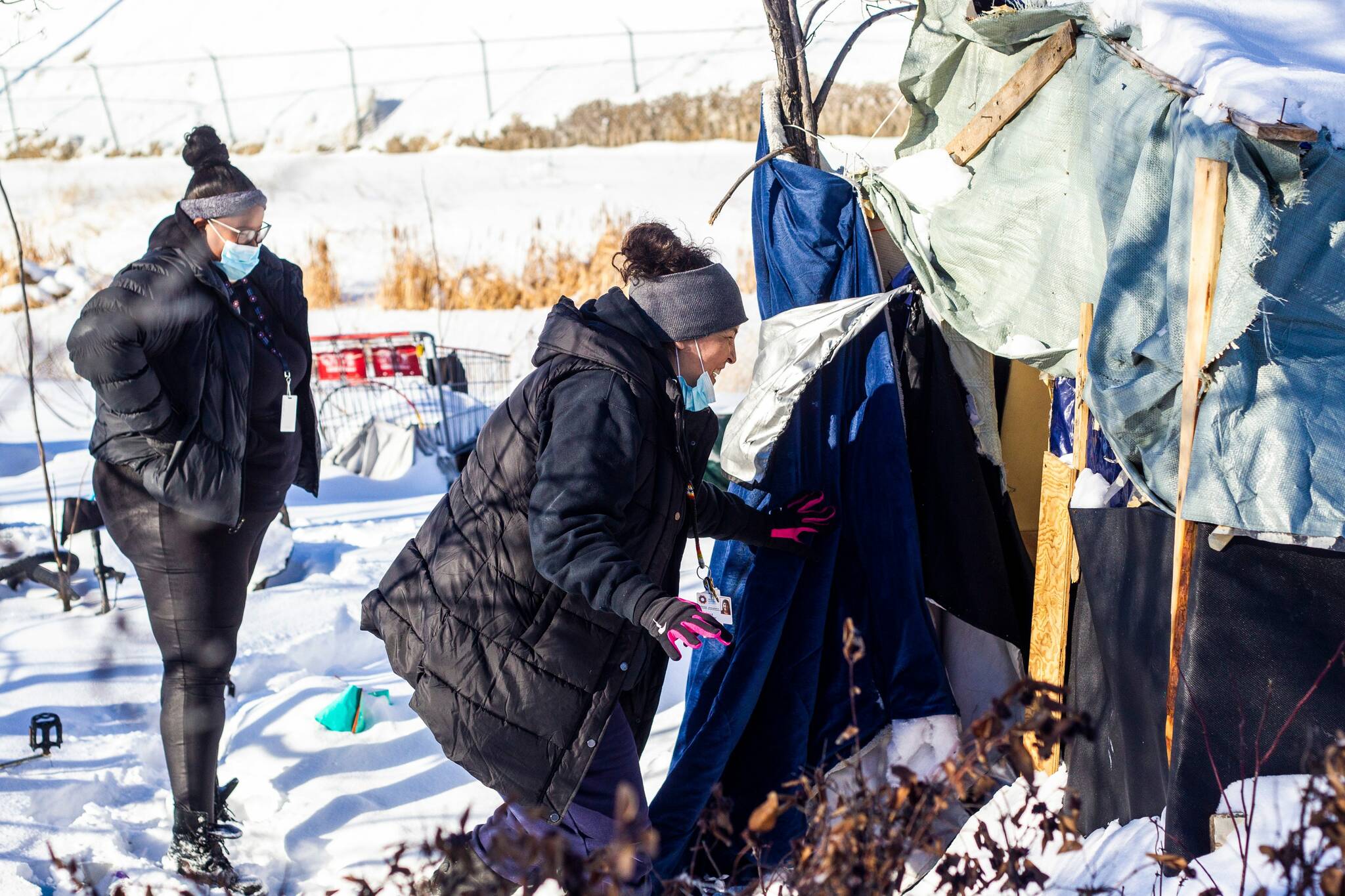
As a courtesy, Robin Eastman announced herself before approaching an encampment in downtown Winnipeg Wednesday.
“Are you guys home?” the 43 year old asked, waiting a moment before lifting a tarp and peering in.
Nobody was inside, but she left behind food, water and socks, expecting the occupants to return. Makeshift structures like this are often vacant during the day, as people leave to seek warmth and resources, she said.
Eastman, a case worker with the Main Street Project, is on the streets daily, offering supports, services and compassion to people without housing in Winnipeg. She believes consistency and communication are the pillars of success.
MIKAELA MACKENZIE / WINNIPEG FREE PRESS Last year, Main Street Project’s outreach program reported contacts with 3,600 people, facilitated 241 Winnipeg Fire Paramedic Service transports and distributed nearly 90,000 units of harm-reduction supplies, food and water bottles.
“We just meet everybody where they are at and ask if they want help,” she said, speaking inside the organization’s outreach van as it cruised through Winnipeg’s core.
“We don’t act like we feel sorry for people, because they don’t want that from us, and they’ll know if you’re treating them that way…. It’s about making connections. Creating that sense of belonging and letting others know we are there for them, because sometimes that’s all they have.”
Eastman, 43, has worked for the non-profit organization for four years, beginning in the detox program before transitioning to the outreach team in December. She and her colleagues work in shifts, offering around-the-clock support, 365 days a year.
How to support
Monetary donations help the Main Street Project provide support to Winnipeg’s most vulnerable.
As a registered charitable organization, it offers tax receipts for any cash donations. People can donate using a secure form online.
Monetary donations help the Main Street Project provide support to Winnipeg’s most vulnerable.
As a registered charitable organization, it offers tax receipts for any cash donations. People can donate using a secure form online.
Main Street Project is currently in need of warm clothing and hygiene products. People can arrange donations in person by contacting Carla Morden at 204-982-8257.
Those who prefer to mail a cheque, can make it out to Main Street Project Inc. at 661 Main Street, Winnipeg, MB, R3B 1E3.
Purchases from Main Street Project’s Amazon wish list will be delivered directly to the organization.
They are prepared to travel anywhere in the city, stopping at bus shelters, street corners and encampments to distribute water, food, warm clothing and sanitary drug-use supplies. If people need housing, financial support or medical attention, workers help connect them.
Last year, Main Street Project’s outreach program reported contacts with 3,600 people, facilitated 241 Winnipeg Fire Paramedic Service transports and distributed nearly 90,000 units of harm-reduction supplies, food and water bottles.
Outreach is not one thing, it’s everything. And it’s not without its challenges. Operational costs can total hundreds of thousands of dollars.
The city committed $80,000 in support of St. Boniface Street Links’ outreach team last year, but in January, founder Marion Willis warned it would not be enough to keep the program running.
Salaries for the team members alone cost the organization about $600,000, she said at the time.
RUTH BONNEVILLE / WINNIPEG FREE PRESS FILES The city committed $80,000 in support of St. Boniface Street Links’ outreach team last year, but in January, founder Marion Willis warned it would not be enough to keep the program running.
Coun. Matt Allard filed a motion that will appear before council later this month asking the city to consider a $220,000 grant in support of the St. Boniface Street Links outreach team.
Outreach can also be taxing on the employees, who facilitate life-changing (and sometimes life-saving) care. Staff encounter people in medical distress daily, sometimes having to contact emergency services or administer naloxone in the event of an overdose, Eastman said.
“You’ve got to be mentally prepared, because you never know what you will find,” she said. “(Without organizations doing outreach) Winnipeg would maybe have a lot more frozen bodies or overdoses.”
Organizations such as Main Street Project have stretched to meet the demands of a homeless population that, based on data from the 2022 Winnipeg Street Census, likely numbers in the thousands.
“You’ve got to be mentally prepared, because you never know what you will find… (Without organizations doing outreach) Winnipeg would maybe have a lot more frozen bodies or overdoses.”–Robin Eastman
Data on the number of overnight shelters available in Winnipeg is not included in the report, but organizations generally agree there are not enough. The issue became obvious this week as outreach staff struggled to find spaces for people in the bitter cold, Eastman said.
The weather is expected to improve on the weekend, but overnight temperatures have fallen below -30 C, -40 with windchill.
To combat the problem, the city provided organizations with access to properties it owns to create temporary warming shelters, including one operated by St. Boniface Street Links in St. Vital.
The shelter is expected to close as temperatures rise, but it was a successful intervention. Street Links staff are currently arranging housing for a handful of people who stayed there this week, Willis said.
“For a 20-bed shelter, that’s not bad,” she said.
MIKAELA MACKENZIE / WINNIPEG FREE PRESS Case worker Robin Eastman checks to see if anyone is around at a camp to offer sandwiches, warm socks, water, and other supplies from the Main Street Project van in Winnipeg.
The support is welcome and necessary, but long-term solutions require the city to increase its stock of affordable and transitional housing, advocates say. It’s something governments have been working toward in recent years.
Municipal, provincial and federal officials have announced multimillion-dollar commitments toward improving homelessness and housing within Manitoba’s capital city.
Many of the city’s future developments are incorporating an approach that prioritizes affordable housing. Projects near the University of Winnipeg and South Point Douglas are expected to be complete before the end of 2024.
The McLaren Hotel, at 554 Main St., is preparing for a non-profit housing retrofit, and the owner of the St. Charles Hotel at 235 Notre Dame Ave. is considering a similar transformation.
MIKAELA MACKENZIE / WINNIPEG FREE PRESS Robin Eastman, a case worker with the Main Street Project, is on the streets daily, offering supports, services and compassion to people without housing in Winnipeg.
Last month, Winnipeg opened its first tiny home village with capacity to house 22 people experiencing homelessness.
Help is on the way, and it can’t come soon enough, Eastman said.
“In my opinion (things are not improving). I hear a lot of talk, but I don’t see the action. I can’t say what goes on behind closed doors, but on the street, things don’t seem to be getting better,” she said.
“Winnipeg needs an immediate fix.”
— With files from Chris Kitching


